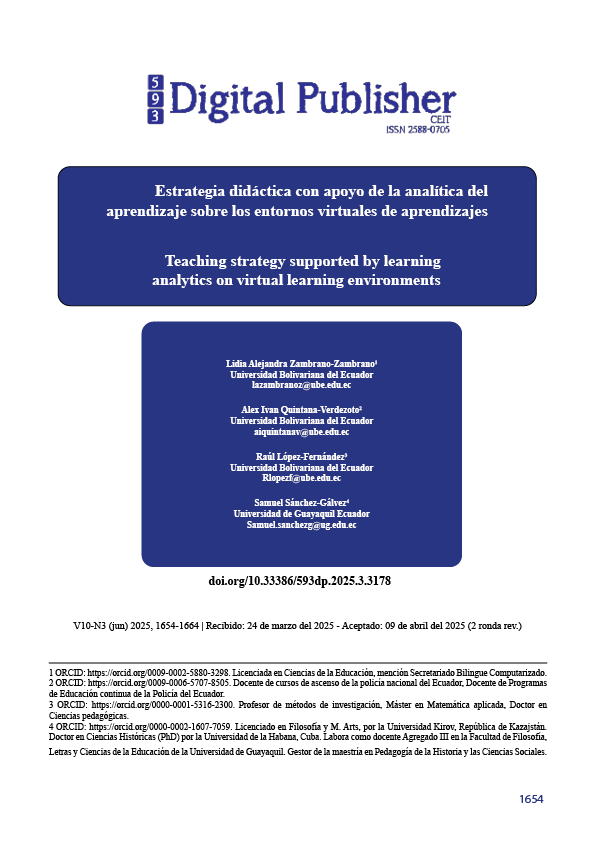Teaching strategy supported by learning analytics on virtual learning environments
Main Article Content
Abstract
Among the fundamental functions of Pedagogy is to ensure, within its personological components, learning strategies that guarantee the appropriation of knowledge by learners. This research aimed to develop a didactic strategy supported by learning analytics for the use of virtual learning environments in the preparation of police officers for promotion courses. The methodology used was qualitative, with the purpose of transforming the educational reality. Theoretical and empirical methods were employed for the educational diagnosis, including the analytical-synthetic, inductive-deductive, expert judgment, and the Regnier abacus, among others. The main results showed that students had very limited skills in using virtual learning environments and highlighted the importance they attribute to learning analytics. Another significant aspect was the selection of 10 experts through the competence coefficient and the colorimetric results regarding the scores and evaluations these professionals provided for the strategy design, which allowed for its readjustment and improvement. It can be concluded that police officers now have a didactic strategy supported by learning analytics, which facilitates their performance in virtual learning environments.
Downloads
Article Details

This work is licensed under a Creative Commons Attribution-NonCommercial-ShareAlike 4.0 International License.
1. Derechos de autor
Las obras que se publican en 593 Digital Publisher CEIT están sujetas a los siguientes términos:
1.1. 593 Digital Publisher CEIT, conserva los derechos patrimoniales (copyright) de las obras publicadas, favorece y permite la reutilización de las mismas bajo la licencia Licencia Creative Commons 4.0 de Reconocimiento-NoComercial-CompartirIgual 4.0, por lo cual se pueden copiar, usar, difundir, transmitir y exponer públicamente, siempre que:
1.1.a. Se cite la autoría y fuente original de su publicación (revista, editorial, URL).
1.1.b. No se usen para fines comerciales u onerosos.
1.1.c. Se mencione la existencia y especificaciones de esta licencia de uso.
References
Álvarez, C. (1990). Modelos de diagnóstico educativo. https://www.redalyc.org/pdf/4780/478047207007.pdf
Bermúdez, J., & Pérez, R. (Año). Título de la obra. https://tuvntana.wordpress.com/wp-content/uploads/2015/06/psicologia-de-la-personalidad-bermudez-perez-y-ruiz.pdf
Buendía, L. (2019). Paradigmas emergentes en la investigación educativa. https://exactas.unca.edu.ar/riecyt/VOL%204%20NUM%202/TEXTO%207.pdf
Buendía, L. (2020). Investigación cualitativa en educación: Nuevos enfoques metodológicos. https://portal.amelica.org/ameli/jatsRepo/59/59717003/html/index.html
Corona, M., et al. (2019). Limitaciones del uso de Moodle en entornos educativos. https://www.redalyc.org/journal/5534/553471896005/html/
Field, A. (2019). Métodos de observación participante en la investigación educativa. Galaige, A., & Torrisi-Steele, G. (2019). La analítica del aprendizaje en educación virtual. https://www.researchgate.net/publication/351376674_Analitica_del_aprendizaje_significativo_d-learning_aplicado_en_la_ensenanza_de_la_fisica_de_la_educacion_secundaria
Gasevic, D., et al. (2015). Analítica del aprendizaje: Fundamentos y aplicaciones en educación. https://www.redalyc.org/journal/6882/688272156008/html/
Guzmán, M. del C., Albornoz, E. J., & Alvarado, R. (2022). La didáctica en los entornos virtuales de aprendizaje. Revista Metropolitana de Ciencias Aplicadas, 5(1), 96–102. https://www.redalyc.org/articulo.oa?id=721778113013
Hernández-Sampieri, R. (2022). Metodología de la investigación: Fundamentos y prácticas. https://www.uv.mx/personal/cbustamante/files/2011/06/metodologia-de-la-investigaci%C3%83%C2%B3n_sampieri.pdf
Hernández-Sellés, N., & Muñoz-Carril, P. C. (2024). Aprendizaje colaborativo en entornos digitales. RIED-Revista Iberoamericana de Educación a Distancia, 27(2), 2–6. https://doi.org/10.5944/ried.27.2.40208 https://www.redalyc.org/journal/3314/331477742001/
López, J., & Fernández, P. (2021). El aprendizaje en contextos educativos: Teoría y práctica. https://dialnet.unirioja.es/servlet/libro?codigo=792664
López Fernández, P., et al. (2023). Analítica del aprendizaje en educación: Retos y perspectivas. http://scielo.sld.cu/scielo.php?script=sci_arttext&pid=S1815-76962024000100033
Maguiño, E., et al. (2020). Recursos didácticos digitales y aprendizaje en educación básica. https://www.redalyc.org/journal/6079/607974617004/html/
Morales, R. (2012). Recursos didácticos en la educación moderna. http://www.scielo.org.bo/scielo.php?script=sci_arttext&pid=S1652-67762017000100011
Pérez, F., & Hernández, C. (2023). Métodos analítico-sintéticos en la investigación educativa. https://www.redalyc.org/pdf/206/20652069006.pdf
Rizo, M. (2019). Moodle y su impacto en la educación virtual. https://portal.amelica.org/ameli/journal/466/4663734039/4663734039.pdf
Roselli, M. (2007). Metodologías de aprendizaje colaborativo en entornos virtuales. file:///C:/Users/Usuario/Downloads/Dialnet-ElAprendizajeColaborativoEnAmbientesVirtuales-652184%20(1).pdf
Salazar, C. A. H., & Chancahuana, M. E. (2021). Entornos virtuales como herramienta de apoyo al sistema de aprendizaje contable: Un desarrollo necesario. Revista de Ciencias Sociales (Ve), 27(Esp.3), 64–75. https://www.redalyc.org/journal/280/28068276007/
Sánchez, L. (2021). Herramientas digitales para el aprendizaje. file:///C:/Users/Usuario/Downloads/Dialnet-HerramientasDigitalesEnElAprendizajeYSuRelacionCon-9052306.pdf
Solar, D. (2011). Analítica del aprendizaje: Definición y aplicaciones. http://scielo.sld.cu/pdf/rus/v14n6/2218-3620-rus-14-06-40.pdf
Umaña, L. I. L. (2023). El análisis del aprendizaje aplicado como estrategia para mejorar la educación en los entornos virtuales. Revista Educación, 47(2), 1–25. https://doi.org/10.15517/revedu.v47i2.53945 https://www.redalyc.org/journal/440/44074795040/
Valle Lima, G. (2017). Estrategias didácticas en la educación: Teoría y práctica. http://www.scielo.org.bo/scielo.php?script=sci_arttext&pid=S2616-79642023000200758
Vargas Murillo, L. (2017). Materiales y recursos didácticos en educación: Una perspectiva actual. http://www.scielo.org.bo/scielo.php?script=sci_arttext&pid=S1652-67762017000100011
Zoila, A., & Adelina, T. (2023). El uso de recursos didácticos en el aprendizaje efectivo. https://www.researchgate.net/publication/373939318_Los_recursos_didacticos_como_apoyo_en_el_proceso_de_ensenanza-aprendizaje_de_los_estudiantes





